Findings from the 2015 American Values Survey.
▶ Read the full report here. ▶ Read the news release here. ▶ Read the topline questionnaire, including the survey methodology, here. ▶ Read the 2015 AVS Supplement, with updated candidate choice and favorability, here.
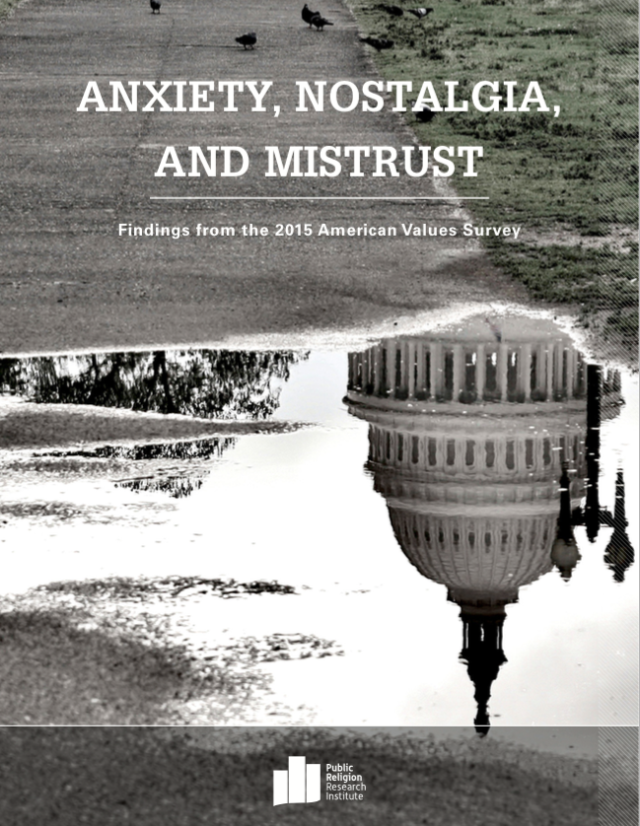 Health Care, Terrorism, and Jobs Most Critical Issues
Health Care, Terrorism, and Jobs Most Critical Issues
When asked what issues are most important to them personally, Americans are more likely to cite health care (63%), terrorism (62%), and jobs and unemployment (60%) than any other issue. A majority (53%) of Americans report that crime is a critical issue to them personally. Slightly fewer say the cost of education (49%), economic inequality (48%), and immigration (46%) are critical issues. Fewer Americans say that race relations (39%), climate change (34%), abortion (34%), religious liberty (31%), and same-sex marriage (25%) are critical issues.
Strong majorities of both Democrats and Republicans name health care (71% and 61%, respectively) and jobs and unemployment (66% and 59%, respectively) as critical issues. However, Democrats are more likely than Republicans to name the cost of education (62% vs. 33% respectively) and the growing gap between the rich and the poor (62% vs. 29%, respectively) as critical issues. Republicans are more likely than Democrats to name terrorism (79% vs. 53%, respectively) and immigration (59% vs. 43%, respectively) as critical issues.
However, even among Republicans, the importance of immigration varies. On no issue do the supporters of Republican presidential hopeful Donald Trump differ more from those supporting other Republican candidates than on the issue of immigration. Nearly seven in ten (69%) Trump supporters say that immigration is a critical issue to them personally. In contrast, only half (50%) of those who support other Republican candidates say that the issue of immigration is critically important to them.
The Bush/Clinton Dynasty Dilemma
Although Jeb Bush and Hillary Clinton each entered the 2016 campaign with considerable assets, their famous last names may not be among them. Most (54%) Americans say that electing another president from the “Bush” or “Clinton” family would be bad for the country, while 45% disagree. The dynasty dilemma is a bigger problem for Bush than for Clinton. More than six in ten (61%) Republicans—including 64% of likely Republican primary voters—and nearly seven in ten (69%) Tea Party members say that electing another Bush or Clinton would be bad for the country, compared to 42% of Democrats overall and 39% of likely Democratic primary voters.
The Declining Tea Party Movement
The proportion of Americans who identify with the Tea Party movement has declined by nearly half over the last five years, from 11% in 2010 to 6% today. Tea Party affiliation has also dropped among Republicans, from 22% in 2010 to 14% today. Favorable views of the Tea Party have dropped 10 percentage points over the last year, from 35% in 2014 to 25% today. A majority (57%) of Americans currently hold an unfavorable view of the group, up from 46% last year. The decline of Tea Party favorability is pronounced among Republicans (58% in 2014 vs. 45% today), independents (35% in 2014 vs. 27% today), and Democrats (18% in 2014 vs. 12% today).
Americans’ Gloomy Economic Outlook Persists
Americans continue to have a bleak outlook about the economy. More than seven in ten (72%) Americans believe that the country is still in a recession, while roughly one-quarter (27%) believe the economic recession is over. Americans’ views about the economic recession have remained steady over the last few years, with an identical percentage (72%) of Americans saying the country was still in a recession in 2014, and 76% saying the country was still in a recession in 2012.
Americans have become more pessimistic about the country’s future than they were just a few years earlier. Today, Americans are evenly divided over whether America’s best days are ahead of us (49%) or behind us (49%). In 2012, a majority (54%) of the public said that America’s best days were ahead, while fewer than four in ten (38%) said that they were behind. No group expresses greater pessimism about America’s future than members of the Tea Party. Only one-third (33%) of Tea Party members say that the country’s best days lie ahead, while about two-thirds (65%) say they are in the past.
Perceptions about America’s future vary by religious affiliation. Among religious groups, white evangelical Protestants and white mainline Protestants are markedly more pessimistic than other groups, with majorities believing that America’s best days are behind us (60% and 55%, respectively). By contrast, majorities of Americans who are affiliated with non-Christian religions (55%), Catholics (56%), black Protestants (57%), and religiously unaffiliated Americans (58%) all believe America’s best days are ahead of us.
Americans’ increasing pessimism about the direction of the country is reflected in their views about prevalent problems within their local communities. The number of Americans citing crime, racial tensions, and illegal immigration as major problems increased substantially between 2012 and 2015.
The number of Americans saying crime is a major problem in their community jumped 15 percentage points (up from 33% to 48%), while the number of Americans saying racial tensions are a major concern jumped 18 percentage points (from 17% to 35%).
The number of Americans saying illegal immigration is a major problem ticked up 8 percentage points (from 28% to 36%).
In order to provide an overall measure of Americans’ attitudes about the fairness of the economic system in the U.S., we created an Economic Inequity Index (EII). Americans are skewed toward the top end of the scale. Nearly half (48%) of Americans perceive a great amount of inequity in the economic system, scoring very high on the EII. About one in five (21%) see a high amount of economic inequity, 20% see a moderate amount of economic inequity, and 11% perceive the economic playing field to be basically level, scoring low on the EII.
Continued Strong Support for Minimum Wage and Workplace Policies
Nearly two-thirds (65%) of Americans believe that “one of the big problems in this country is that we don’t give everyone an equal chance in life,” while fewer than three in ten (28%) believe that “it is not really that big a problem if some people have more of a chance in life than others.” Concerns about the lack of equal opportunity have increased considerably since 2010, when 53% said that one of the big problems in the U.S. was the lack of equal opportunities for all.
More than three-quarters (76%) of Americans support raising the minimum wage from $7.25 to $10.10 per hour. Support has ticked up significantly since 2014, when 69% of Americans expressed support for raising the minimum wage to $10.10 per hour. Nearly six in ten (59%) Americans express support for raising the minimum wage even higher—to $15 an hour—but there is less agreement across political party lines for the larger wage hike. Roughly equal numbers of Democrats favor raising the minimum wage to either $10.10 or $15 (91% vs. 84%, respectively). In contrast, while six in ten (60%) Republicans support raising the minimum wage to $10.10, fewer than one-third (32%) say they favor raising it to $15 per hour.
Americans overwhelmingly support requiring companies to provide all full-time employees with paid sick days if they or an immediate family member gets sick (85%), and requiring companies to provide all full-time employees with paid leave for the birth or adoption of a child (82%).
Anxieties about Cultural Change
A majority (53%) of Americans say that American culture and way of life has mostly changed for the worse since the 1950s, compared to 46% who say it has changed for the better.
Six in ten (60%) black Americans and a majority (54%) of Hispanic Americans believe that American culture has mostly changed for the better since the 1950s. In contrast, only 42% of white Americans agree, and 57% say that the American way of life has mostly changed for the worse over the last sixty years.
While a majority of independents (56%), Republicans (67%), and members of the Tea Party (72%) say American culture and way of life has gotten worse since the 1950s, only 40% of Democrats agree.
Today, Americans are evenly divided as to whether immigrants strengthen the country because of their hard work and talents (47%) or whether they are a burden on the U.S. because they take jobs, housing, and health care (46%).
By a margin of approximately two-to-one, Democrats are more likely to say that immigrants strengthen the country than to say that immigrants are a burden to the country (63% vs. 32%, respectively).
By a similar margin, Republicans are more likely to say the opposite—that immigrants burden the country as opposed to strengthen it (66% vs. 26%, respectively). Views of Tea Party members do not differ significantly from Republicans overall.
Compared to a few years earlier, Americans report less tolerance when encountering immigrants who do not speak English. Nearly half (48%) of Americans agree that they are bothered when they come into contact with immigrants who speak little or no English, compared to 40% in 2012. More than six in ten (63%) white working-class Americans say they feel bothered when they come into contact with immigrants who do not speak English, compared to 43% of white college-educated Americans.
Americans’ perceptions of Islam have turned more negative over the past few years. Today, a majority (56%) of Americans agree that the values of Islam are at odds with American values and way of life, while roughly four in ten (41%) disagree. In 2011, Americans were divided in their views of Islam (47% agreed, 48% disagreed).
Little Confidence in Government, the Media, and Big Business
There is a wide disparity in public confidence in different major institutions in the country. While majorities of the public report having a great deal or some confidence in the police (75%), the criminal justice system (62%), and organized religion (55%), no more than half say they have a great deal or some confidence in the federal government (50%), news organizations (47%), and large business corporations (46%).
Few Americans say the government looks out for their interests. Only about four in ten (42%) Americans say the government looks out for the needs and interests of people like them either somewhat or very well. Notably, seniors (age 65 and older) are the only major demographic group in which a majority (55%) believe that the government looks out for their needs and interests at least somewhat well.
In order to provide an overall measure of Americans’ attitudes about confidence in major institutions in the U.S., we created an Institutional Mistrust Index (IMI). Americans are fairly evenly distributed across the scale. More than one-third of Americans express high levels of distrust of major institutions, scoring very high (12%) or high (23%) on the IMI. About three in ten (29%) fall into the moderate category, and more than one-third express significant trust in major institutions, scoring low (27%) or very low (9%) on the scale.
Disparate Perceptions of Discrimination and Racism
Muslims and gay and lesbian people top the list of groups who are perceived to be facing a lot of discrimination in the U.S. today, but many Americans also believe that racial and ethnic minorities face substantial discrimination.
Approximately seven in ten Americans say there is a lot of discrimination against Muslims (70%) and gay and lesbian people (68%) in the country today.
A majority of Americans say blacks (63%) and Hispanics (56%) face a lot of discrimination in the U.S.
Americans are more divided on how prevalent discrimination against women is in the United States—45% say there is a lot of discrimination against women in America today, while 53% say there is not.
Relatively few Americans believe that evangelical Christians (30%), Jews (30%), atheists (27%), whites (25%), or white men (22%) confront a great deal of discrimination in American society today.
More than four in ten (43%) Americans say that discrimination against whites has become as big a problem as discrimination against blacks and other minorities, while 55% disagree. Opinions about “reverse discrimination” have remained fairly constant over the past few years. Half (50%) of white Americans—including 60% of white working-class Americans—agree that discrimination against whites has become as big a problem today as discrimination against blacks and other minorities, while fewer than three in ten Hispanic (29%) and black Americans (25%) agree.
In order to provide an overall measure of Americans’ attitudes about race, we created a Racial Inequity Index (RII). Overall, more Americans score low than high on the scale. One-third of Americans score very high (10%), or high (23%) on the scale, indicating that they perceive systemic discrimination against racial minorities as having continued impact on inequality today. About one in five (21%) Americans fall into the moderate category, and nearly half of Americans score low (38%) or very low (8%) on the RII, believing that racial minorities today have equal opportunities as whites. Approximately three-quarters of Republicans (74%) and Tea Party members (75%) perceive few continued effects of racial discrimination today (low scores on the RII), compared to just 22% of Democrats.
Race and Fair Treatment by Police and the Criminal Justice System
A majority (53%) of the public say that recent killings of African American men by police are isolated incidents rather than part of a broader pattern of how police treat African Americans (44%). Views on police killings of African American men are highly stratified by race/ethnicity.
Approximately two-thirds (65%) of white Americans say recent killings of African American men by police are isolated incidents, while about four in ten (41%) Hispanic Americans and only 15% of black Americans say the same.
More than eight in ten (81%) black Americans say recent police killings of African American men are part of a broader pattern of how police treat African Americans.
Among religious groups, white Christians are more likely than other religious groups to say that recent killings of African American men by police are not connected.
More than seven in ten white evangelical Protestants (72%), white mainline Protestants (73%), and white Catholics (71%) believe that killings of African American men by police are isolated incidents.
By contrast, about six in ten Americans who are affiliated with non-Christian religions (62%) and religiously unaffiliated Americans (59%) believe that these killings are part of a broader pattern of how police treat minorities.
Among black Protestants, more than eight in ten (82%) believe they are part of a broader pattern.
Nearly six in ten (58%) Americans disagree that blacks and other minorities receive equal treatment as whites in the criminal justice system, up from 47% in 2013. More than eight in ten (85%) black Americans and two-thirds (67%) of Hispanic Americans disagree that non-whites receive equal treatment in the criminal justice system. White Americans overall are closely divided (52% disagree, 47% agree), but white college-educated Americans are significantly more likely than white working-class Americans to disagree that minorities receive equal treatment in the criminal justice system (64% vs. 47%, respectively).
Americans are also closely divided over whether there are racial disparities in death penalty sentencing. A majority (53%) of Americans agree that a black person is more likely than a white person to receive the death penalty for the same crime, while 45% of Americans disagree. American attitudes about the way that the death penalty is applied are virtually unchanged from 1999. More than eight in ten (82%) black Americans and roughly six in ten (59%) Hispanic Americans, compared to fewer than half (45%) of white Americans, believe that a black person is more likely than a white person to receive a death penalty sentence for the same crime.
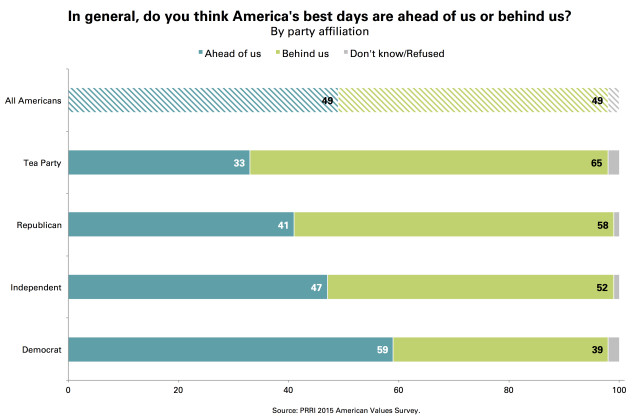
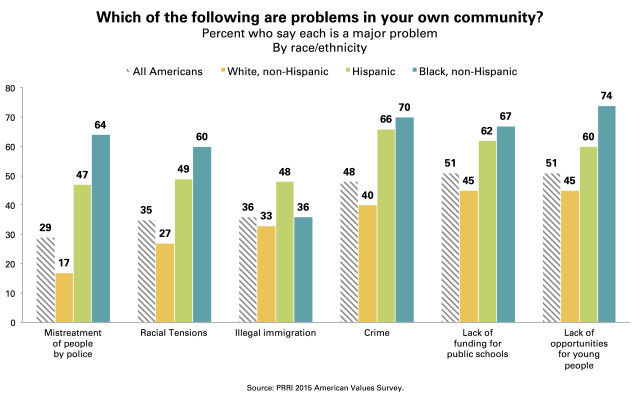
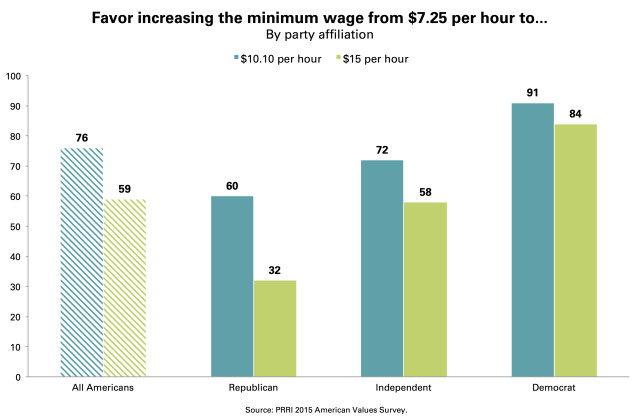
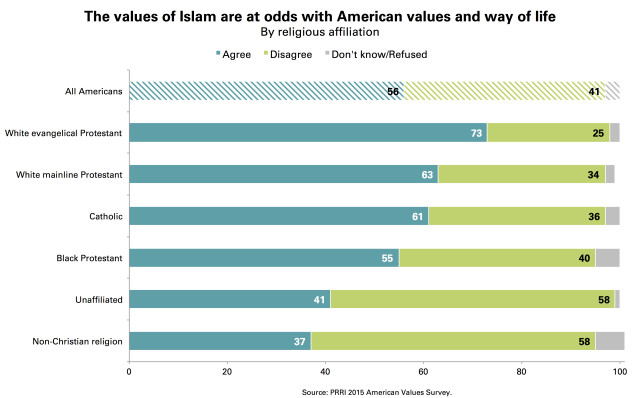
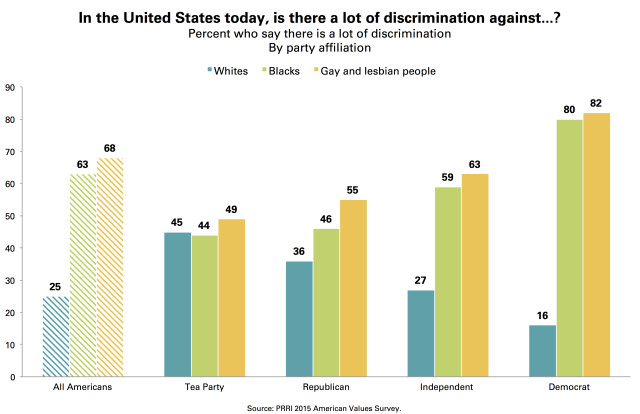
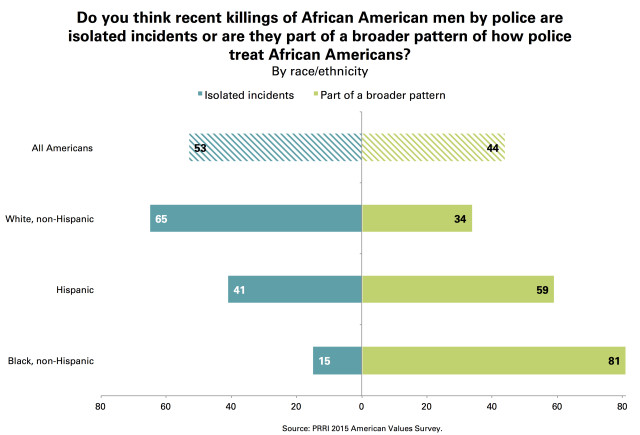
No comments:
Post a Comment